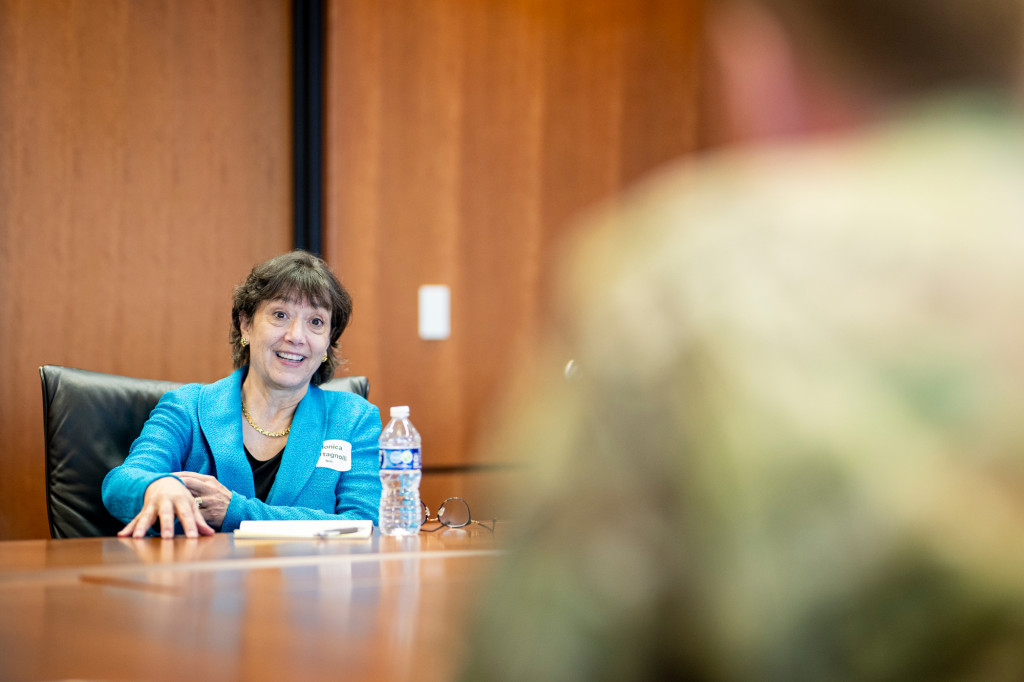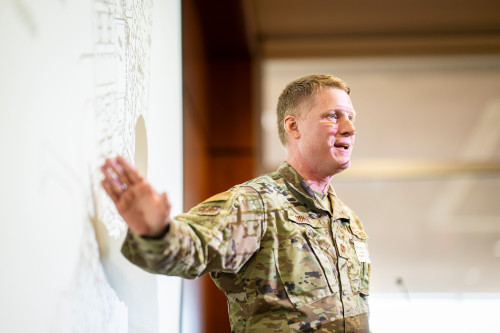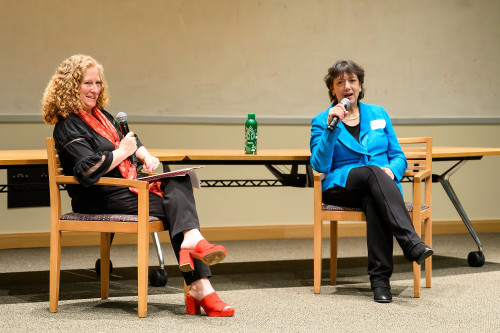NIH director’s visit to UW–Madison highlights biomedical research, future opportunities

NIH Secretary Dr. Monica Bertagnolli (left) discusses cancer therapeutics during a conversation with Human Oncology Professor Zach Morris. Photo: Bryce Richter
As one of the nation’s leading research institutions, the University of Wisconsin–Madison has been at the forefront of countless medical breakthroughs. On Friday, May 31, National Institutes of Health Director Monica Bertagnolli got an up-close view of some of UW’s cutting-edge work to tackle the biggest medical issues of the day, from advances in cancer treatments to bringing research into primary care settings.
Bertagnolli’s trip to campus included meetings with UW researchers and a public conversation with Chancellor Jennifer L. Mnookin, where she discussed NIH funding and new opportunities to improve the nation’s health.
Leading in biohealth innovation

Morris gives a presentation on cancer therapeutics. He describes how new approaches will not only improve patient outcomes, but also enhance business collaborations, ultimately stimulating economic growth. In addition to his clinical work and research, Morris is a Major in the Wisconsin Air National Guard. Photo: Bryce Richter
The daylong visit highlighted the university’s groundbreaking work in areas such as theranostics and precision medicine, and Bertagnolli heard how UW–Madison researchers are combining data-driven diagnostics and innovative technologies to develop highly targeted cancer treatments. Zachary Morris, co-director for the Initiative for Theranostics and Particle Therapy, described how new approaches will not only improve patient outcomes, but also enhance business collaborations, ultimately stimulating economic growth.
“The payoff to the state and region is significant,” noted Morris.
UW–Madison has long been a national leader in biohealth and personalized medicine, with strengths in biotechnology, medical physics and medical engineering. Most recently, the university played a key role in Wisconsin’s designation as a Biohealth Regional Technology and Innovation Hub (Tech Hub). UW and its consortium partners are currently awaiting the results of its Phase 2 application, which could unlock an additional $75 million in federal grants.
Focusing research on real-world impact

Chancellor Mnookin and NIH Director Bertagnolli discuss challenges and opportunities for the National Institutes of Health. Photo: Althea Dotzour
During a well-attended “fireside chat” with Mnookin, Bertagnolli discussed what’s next in biomedical research, NIH’s current approach to funding and the importance of community engagement.
“We need to get deeply into the communities that we care about. What are the environments and factors that are leading to health issues?” said Bertagnolli. “With NIH research, everything we need to do should encompass the lab, the clinic and the communities, because it profoundly influences their health.”
She also shared thoughts on how UW–Madison and other institutions can approach research problems, find funding and improve community health.
“One of the most important things you can do is collaborate and leverage whoever helps you get to your goal. Your goals are keeping people healthy and active. Don’t take no for an answer, be scrappy, until you achieve what you need to for people.”
Bertagnolli emphasized the importance of building collaborative research environments that turn clinical research into tactical application.
“There are so many opportunities at a place that has this amount of depth and creativity. I can’t think of any [research area] that isn’t incredibly worthy that can impact health. If it’s something that you’re devoted to, you can really have an impact.”
This is the approach of UW’s Institute for Clinical and Translational Research (ICTR), her final stop of the day. With NIH funding, ICTR aims to transform the research process by linking basic research to real-life community practice, resulting in practical improvements in human health.
NIH funding fuels pioneering research efforts
NIH funding represents a sizable portion of UW’s overall research enterprise. In 2022-2023, the university was awarded nearly $500 million through the NIH grants, accounting for more than half of all its federal awards. Overall, UW totals $1.52 billion in research expenditures, ranking eighth among public and private universities.
There are currently hundreds of NIH-funded projects underway on campus, spanning a wide range of human health research areas. These include work aimed at understanding, curing and preventing Alzheimer’s and other forms of dementia, restoring cardiac function following heart attacks and more.
“NIH funding is absolutely crucial to our research initiatives,” said Cynthia Czajkowski, interim Vice Chancellor for Research Education, who joined Bertagnolli throughout the day. “It enables our scientists to pursue pioneering work that addresses some of the most pressing nation’s health challenges. Support from NIH not only accelerates scientific breakthroughs but also fuels the training of the next generation of thought leaders and researchers, ensuring continued innovation and impact.”
Among UW–Madison’s highest-profile NIH grants is a national Alzheimer’s and dementia study led by the University of Wisconsin–Madison School of Medicine and Public Health. The project was recently awarded $150 million, the largest NIH grant in the school’s history.
The five-year study will provide state-of-the-art imaging and blood-based biomarkers for researchers around the world to study and advance the field of Alzheimer’s and related dementias. By identifying how Alzheimer’s affects the brain, researchers hope to be able to prevent or delay the onset of the disease and better treat its symptoms – a goal that aligns well with Bertagnolli’s philosophy.
“Our work isn’t done when we make a scientific discovery,” Bertagnolli said, “It’s done when we help people live long and productive lives.”
To learn more about federal research opportunities and UW–Madison’s engagement with federal agencies, subscribe to the Office of Congressional Affairs and Agency Engagement’s Research Update newsletter.
Subscribe to Wisconsin Ideas
Want more stories of the Wisconsin Idea in action? Sign-up for our monthly e-newsletter highlighting how Badgers are taking their education and research beyond the boundaries of the classroom to improve lives.
Tags: biohealth, The Wisconsin Idea




